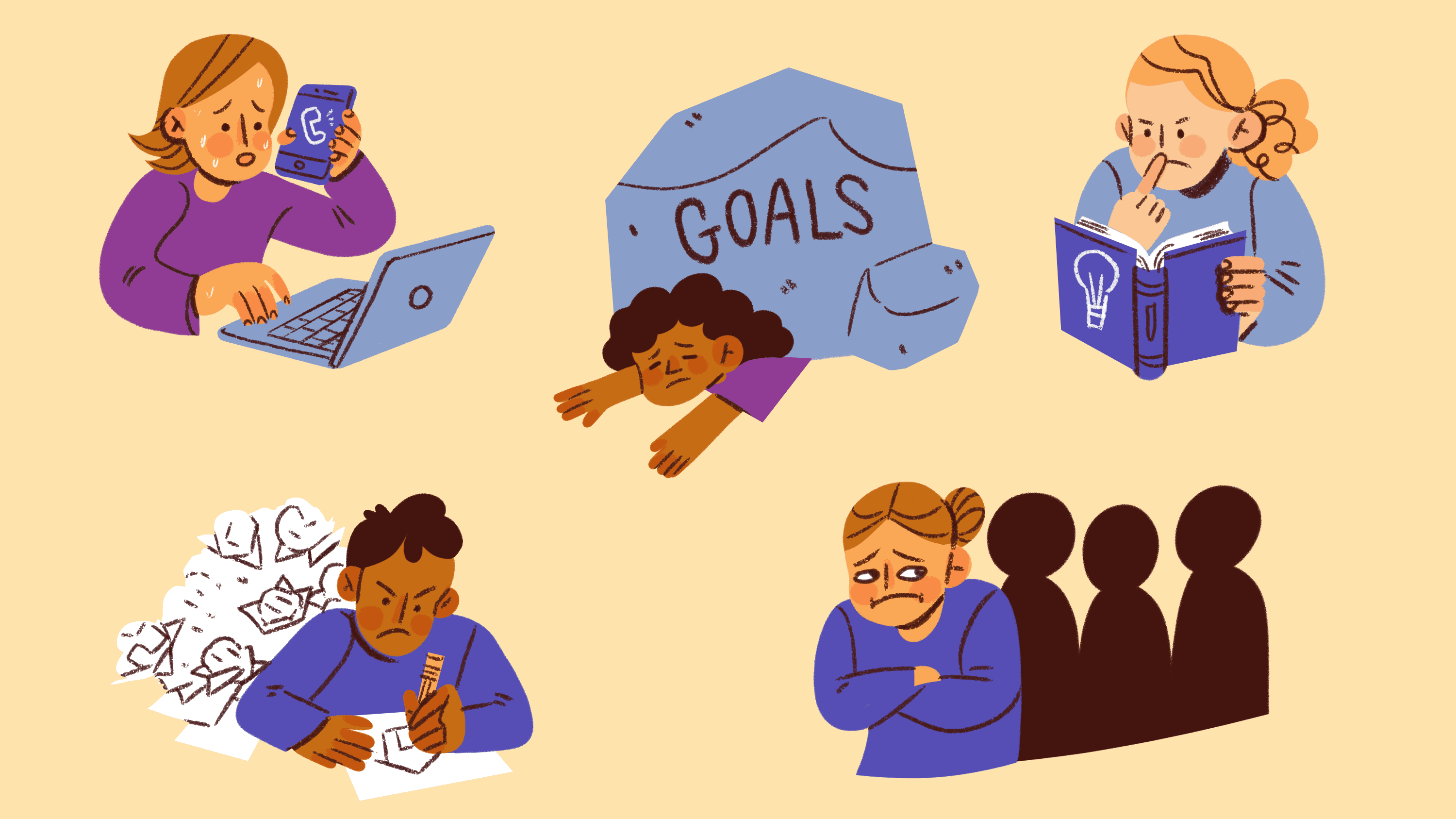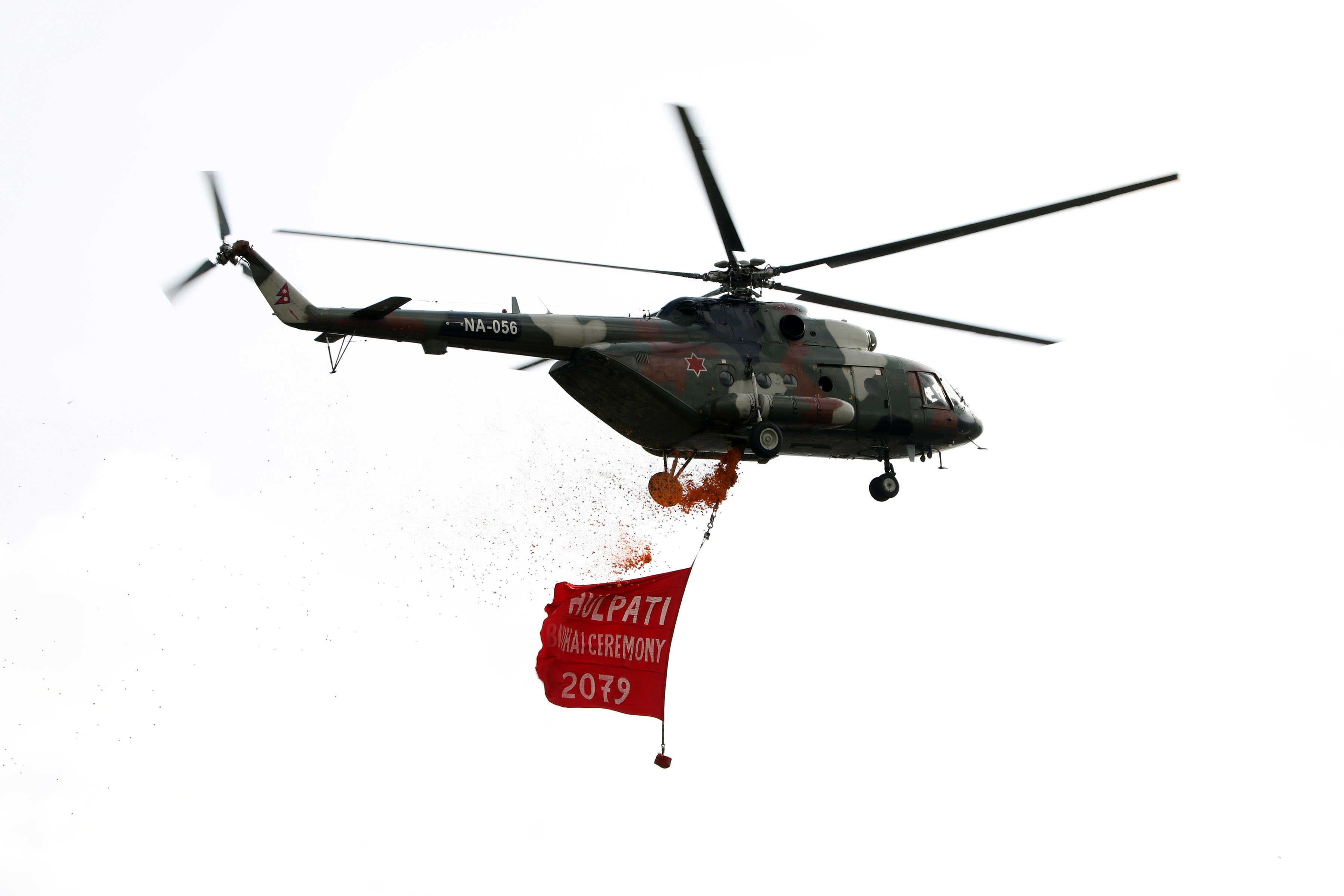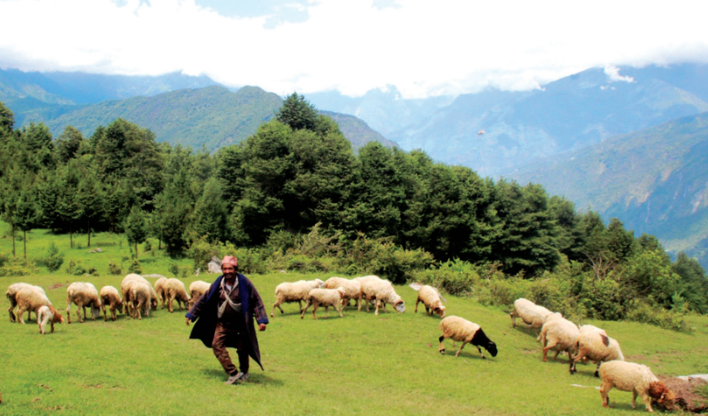Ramesh Sherpa: Changing the course of trading
Quick facts
Born on 25 Sept 1987
Graduated from Tribhuvan University, Kathmandu
Established Silk Group in 2018
Husband to Jangmu Sherpa
Father to Chhime Sherpa and Hissi Sherpa
 My father started a trading business 35 years ago. He imported everyday utility goods to luxury products from China and sold them in the Nepali market. Bringing in consignment from China was quite a challenge back then. The road condition was poor and the journey was full of risk. No one was willing to take this risk before my father.
It was not an easy line of business. Nepal-China trade at the time was a completely new concept. There were trades happening with Tibet, but it was mostly Nepal exporting goods. Tibet being a landlocked country was highly dependent on Nepal for products during those days. Tibet did not made any goods that Nepal could import, but China had a great potential, though there were several risks.
Bad road conditions did not just make travel dangerous, there was also the risk of goods, particularly electronic appliances, getting damaged en route.
Despite the risks, my father was determined to make this business a success.
Back then, Nepal used to import clothes, electronics and other items from places like Japan and Singapore during those days and naturally, they came with huge price tags for a common Nepali to be able to buy them. Only rich people could enjoy these items but for the low- and middle-income people, even the basic items seemed like a luxury.
Can you imagine, an average Nepali could not even buy a decent jacket to see them through the winter during those days? The Chinese products that my father imported were much cheaper. Everyone could afford them. So, in a way, my father’s business created a level playing field for consumers.
I formally joined the business 15 years ago but I grew up observing and learning about this trade since my childhood. My mother used to handle the business in Khasa and my father in Kathmandu. Although I was raised in Sindhupalchok, I used to stay with one of my parents during my one-month long Dashain holiday. So, besides spending most of my time in Sindhupalchok, I was also going back and forth between Khasa and Kathmandu. The way I spent my childhood has a lot to do with what I am today. I learned the ins and outs of my family business from my parents.
Of course, every business is driven by profit. But my father started this business not just with the sole objective of making profit. He also wanted to provide affordable and quality products to common Nepalis, not just the wealthy ones. We carry the same business values to this day.
[caption id="attachment_32117" align="alignnone" width="300"]
My father started a trading business 35 years ago. He imported everyday utility goods to luxury products from China and sold them in the Nepali market. Bringing in consignment from China was quite a challenge back then. The road condition was poor and the journey was full of risk. No one was willing to take this risk before my father.
It was not an easy line of business. Nepal-China trade at the time was a completely new concept. There were trades happening with Tibet, but it was mostly Nepal exporting goods. Tibet being a landlocked country was highly dependent on Nepal for products during those days. Tibet did not made any goods that Nepal could import, but China had a great potential, though there were several risks.
Bad road conditions did not just make travel dangerous, there was also the risk of goods, particularly electronic appliances, getting damaged en route.
Despite the risks, my father was determined to make this business a success.
Back then, Nepal used to import clothes, electronics and other items from places like Japan and Singapore during those days and naturally, they came with huge price tags for a common Nepali to be able to buy them. Only rich people could enjoy these items but for the low- and middle-income people, even the basic items seemed like a luxury.
Can you imagine, an average Nepali could not even buy a decent jacket to see them through the winter during those days? The Chinese products that my father imported were much cheaper. Everyone could afford them. So, in a way, my father’s business created a level playing field for consumers.
I formally joined the business 15 years ago but I grew up observing and learning about this trade since my childhood. My mother used to handle the business in Khasa and my father in Kathmandu. Although I was raised in Sindhupalchok, I used to stay with one of my parents during my one-month long Dashain holiday. So, besides spending most of my time in Sindhupalchok, I was also going back and forth between Khasa and Kathmandu. The way I spent my childhood has a lot to do with what I am today. I learned the ins and outs of my family business from my parents.
Of course, every business is driven by profit. But my father started this business not just with the sole objective of making profit. He also wanted to provide affordable and quality products to common Nepalis, not just the wealthy ones. We carry the same business values to this day.
[caption id="attachment_32117" align="alignnone" width="300"]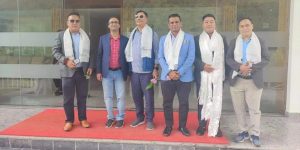 Ramesh Sherpa (second from right) during the opening ceremony of Operation and Management of Tatopani Dry Port.[/caption]
While I was in high school, my classes used to be over by 10 in the morning, so I started to involve myself in the business during my free time. My parents did not have any educational background, and yet they had established a successful business. They believed that I could bring more to the table since I was educated.
My hometown is a place filled with businesspersons, and I always wanted to be one of them. However, I did not just want to become a businessman from Sindhupalchok. I wanted to be a businessman who is known across the country. I have to say I did reach to that level, but I still feel I have a lot of room for improvement.
During the first few years of formally joining my family business, I did things the traditional way. I followed the footsteps of my parents. But I always wanted to introduce some new ideas and changes. Among those changes, one of them was building a name. A brand for the business not just deals in trading of goods but also handles several logistical avenues. Silk Group Pvt Ltd was formed in 2018.
I believe that our local products need better branding and exposure so that we could export them. Our local businesses have a lot of potential. Before, we had to import everything from outside. But now, many of those imported goods can be replaced by our own products, from packaged goods to hygiene to hardwares.
Why can’t we be the once exporting goods to other countries when others can do the same. I see a lot of potential here.
Today, most aspects of how we conduct business have changed. If you look at the developing world, you see that most things are digital. Technology has transformed the business landscape and I believe Nepali businesses must adapt accordingly. We do not have a choice but to upgrade ourselves in order to keep up.
There are many policies introduced by the Nepal government that favor businesses to prosper. I believe that there is a lot of potential for Nepali businesses to flourish if they were to follow the right track.
Ramesh Sherpa (second from right) during the opening ceremony of Operation and Management of Tatopani Dry Port.[/caption]
While I was in high school, my classes used to be over by 10 in the morning, so I started to involve myself in the business during my free time. My parents did not have any educational background, and yet they had established a successful business. They believed that I could bring more to the table since I was educated.
My hometown is a place filled with businesspersons, and I always wanted to be one of them. However, I did not just want to become a businessman from Sindhupalchok. I wanted to be a businessman who is known across the country. I have to say I did reach to that level, but I still feel I have a lot of room for improvement.
During the first few years of formally joining my family business, I did things the traditional way. I followed the footsteps of my parents. But I always wanted to introduce some new ideas and changes. Among those changes, one of them was building a name. A brand for the business not just deals in trading of goods but also handles several logistical avenues. Silk Group Pvt Ltd was formed in 2018.
I believe that our local products need better branding and exposure so that we could export them. Our local businesses have a lot of potential. Before, we had to import everything from outside. But now, many of those imported goods can be replaced by our own products, from packaged goods to hygiene to hardwares.
Why can’t we be the once exporting goods to other countries when others can do the same. I see a lot of potential here.
Today, most aspects of how we conduct business have changed. If you look at the developing world, you see that most things are digital. Technology has transformed the business landscape and I believe Nepali businesses must adapt accordingly. We do not have a choice but to upgrade ourselves in order to keep up.
There are many policies introduced by the Nepal government that favor businesses to prosper. I believe that there is a lot of potential for Nepali businesses to flourish if they were to follow the right track.
 About him
Kishor Bhattarai (Friend)
About him
Kishor Bhattarai (Friend)
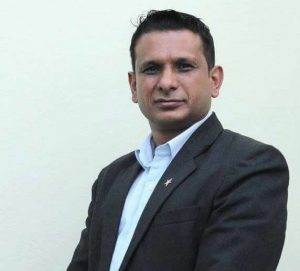 Ramesh is a young dynamic leader. He has created an empire that is well known for Nepal-China trade, both in terms of import and export. He is one of the firsts in Nepal to do so. He has made the future for other businesspersons a little easier when it comes to doing business with China.
Bidhyabaridhi Sigdel (Friend)
Ramesh is a young dynamic leader. He has created an empire that is well known for Nepal-China trade, both in terms of import and export. He is one of the firsts in Nepal to do so. He has made the future for other businesspersons a little easier when it comes to doing business with China.
Bidhyabaridhi Sigdel (Friend)
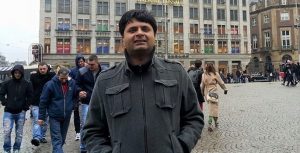 Ramesh is the most friendly and humble person I know. Professionally, I have seen him work hard to fulfill his ambitions and become the prominent businessman he is today. He is keen to explore new things and is always determined to do the best he can. I admire him for his perseverance and convictions.
Krishna Regmi (Colleague)
Ramesh is the most friendly and humble person I know. Professionally, I have seen him work hard to fulfill his ambitions and become the prominent businessman he is today. He is keen to explore new things and is always determined to do the best he can. I admire him for his perseverance and convictions.
Krishna Regmi (Colleague)
 I have known Ramesh ji for the past four years now and one thing I can say about him with utmost certainty is that he is a dynamic leader. He is very mature for his age and is born to be an entrepreneur. And if I have to talk about his personality, he is one of the most professional and determined person I have met.
I have known Ramesh ji for the past four years now and one thing I can say about him with utmost certainty is that he is a dynamic leader. He is very mature for his age and is born to be an entrepreneur. And if I have to talk about his personality, he is one of the most professional and determined person I have met.
Phulpati celebrated in Tudikhel (Photo Feature)
In the presence of President Bidya Devi Bhandari, a special event of Phulpati was held by the Nepal Army on Sunday at Tudikhel. 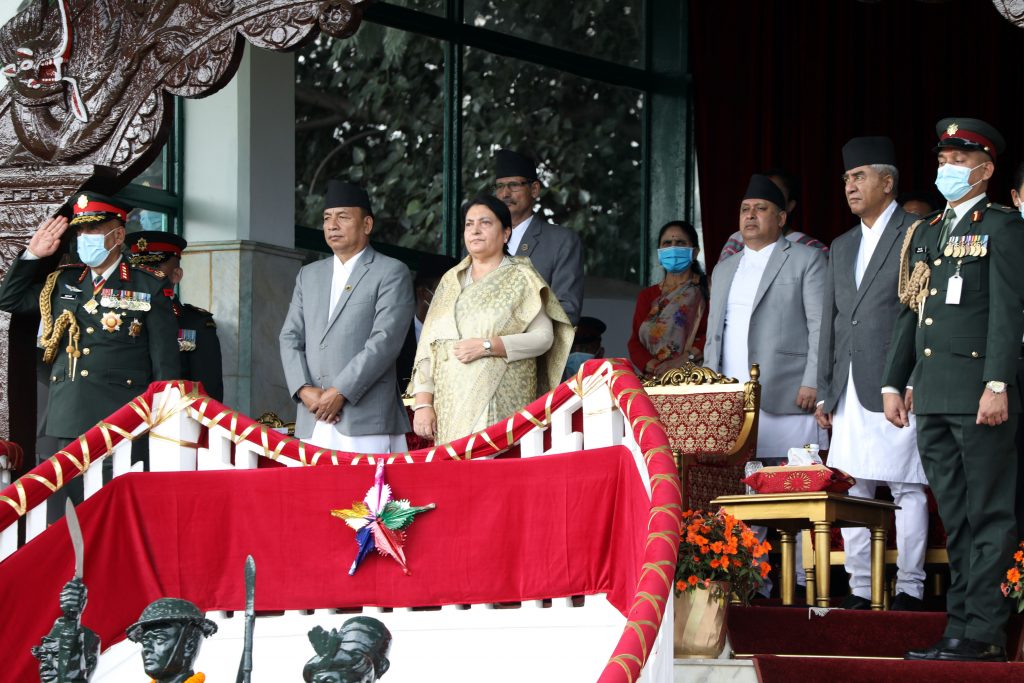
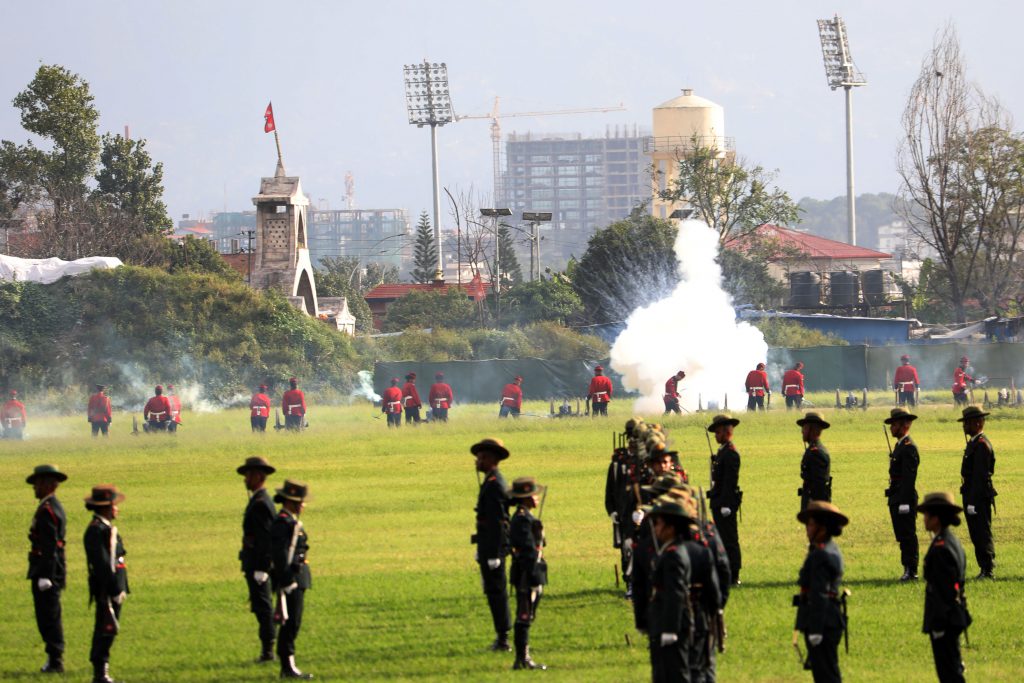 During the ceremony, the army presented the helicopter show, parade, rifle wave and the gun and cannon salute.
During the ceremony, the army presented the helicopter show, parade, rifle wave and the gun and cannon salute. 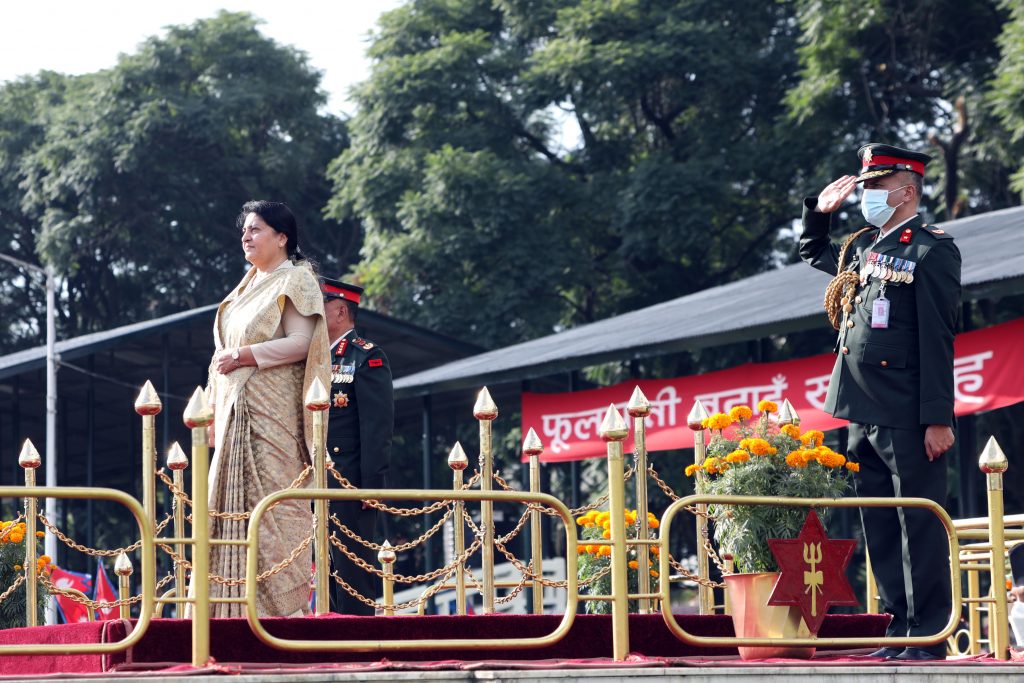
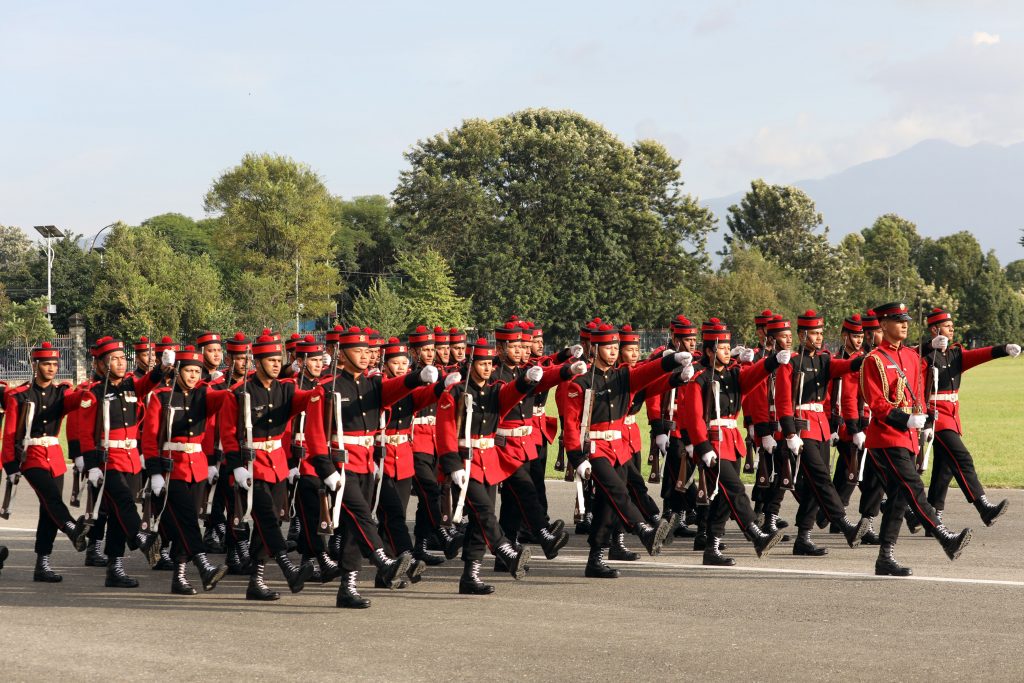 Along with the president, Vice President Nanda Bahadur Pun, Prime Minister Sher Bahadur Deuba, Acting Chief Justice Harikrishna Karki, Speaker of House of Representatives Agni Prasad Sapkota, Speaker of the National Assembly Ganesh Prasad Timilsina, ministers and other high-ranking government officials participated in the ceremony.
Along with the president, Vice President Nanda Bahadur Pun, Prime Minister Sher Bahadur Deuba, Acting Chief Justice Harikrishna Karki, Speaker of House of Representatives Agni Prasad Sapkota, Speaker of the National Assembly Ganesh Prasad Timilsina, ministers and other high-ranking government officials participated in the ceremony. 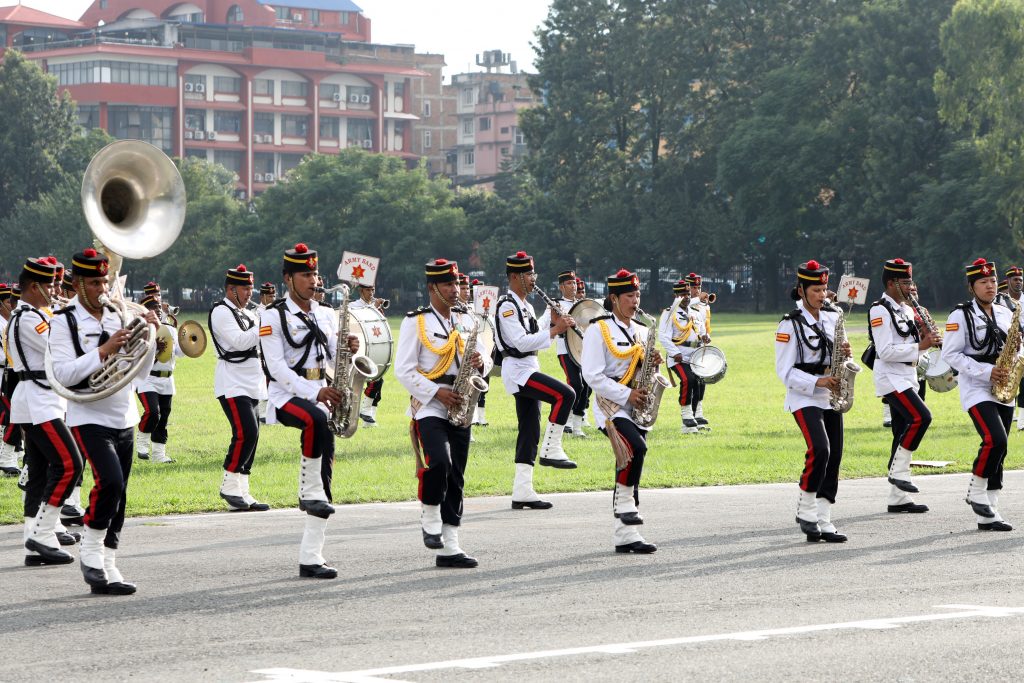
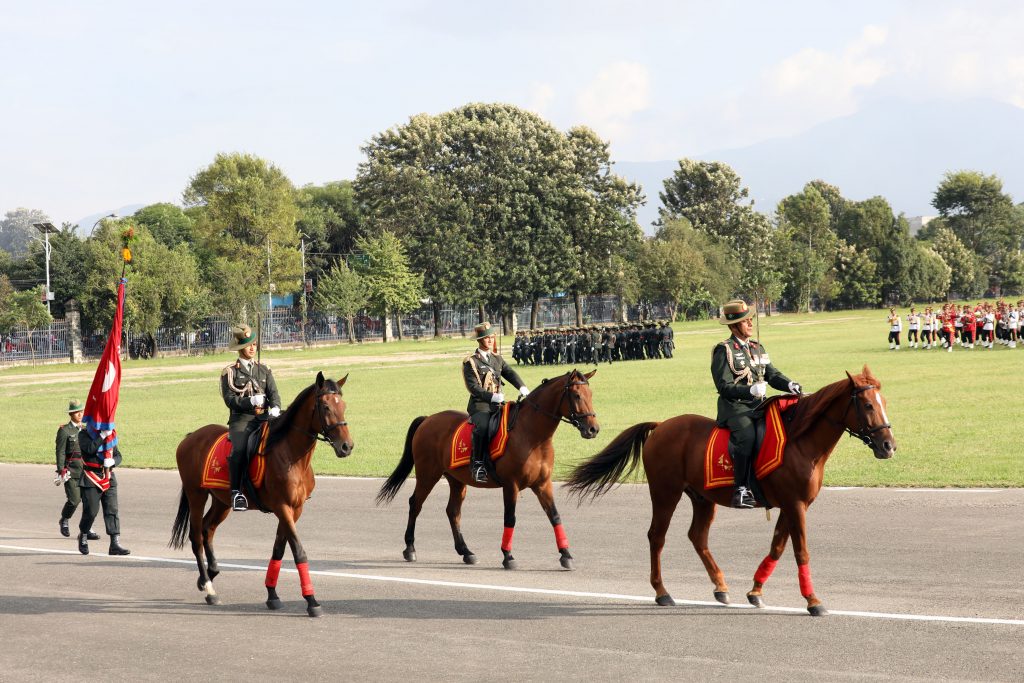
EC publishes expenditure limits for Nov polls (with list)
The Election Commission has set the maximum extent (limit) of expenditure by political parties or candidates for the election of House of Representatives and the Province Assembly.
The Commission has determined the extent of expenditure based on the number of voters, number of polling stations and the area of the constituency in accordance with the existing law.
As the political parties suggested the EC not to set the same limit of election expenses for all constituencies, the Commission has decided to vary the expenditure limit.
While determining the limit, 60 percent was allocated for the number of voters in the respective constituencies, 20 percent for the number of polling stations and another 20 percent for the area occupied by the respective constituencies.
In the election of the House of Representatives for first past the post type, the limit of election expenses in the constituencies 1, 3, 6, 7 and 8 of Kathmandu is Rs 2.5m. Similarly, Rs 2.7m for 17 constituencies, Rs 2.9m for 65 constituencies, Rs 3.1m for 52 constituencies and Rs 3.3m in 26 constituencies is fixed by the EC.
Similarly, in the election of the Province Assembly for first past the post type, the extent of election expenditure is the mentioned Rs 1.5m for 70 constituencies, Rs 1.7m for 143 constituencies, Rs 1.9m for 56 constituencies, Rs 2.1m for 29 constituencies and Rs 2.3m for 32 constituencies.
Shaligram Sharma Poudel, the spokesperson of the Commission, in a statement, said that the expenses limit in the election of the members of the House of Representatives for the proportional representation type will be Rs 200,000 per candidate. For the proportional representation type of the Provincial Assembly, Rs 150,000 per candidate is set.
The political parties or candidates participating in the election will be allowed to spend the specified amount on electoral roll purchase, vehicles, publicity material, transportation, conference, interaction, print and electronic media (including social media), office operation and representative mobilization.
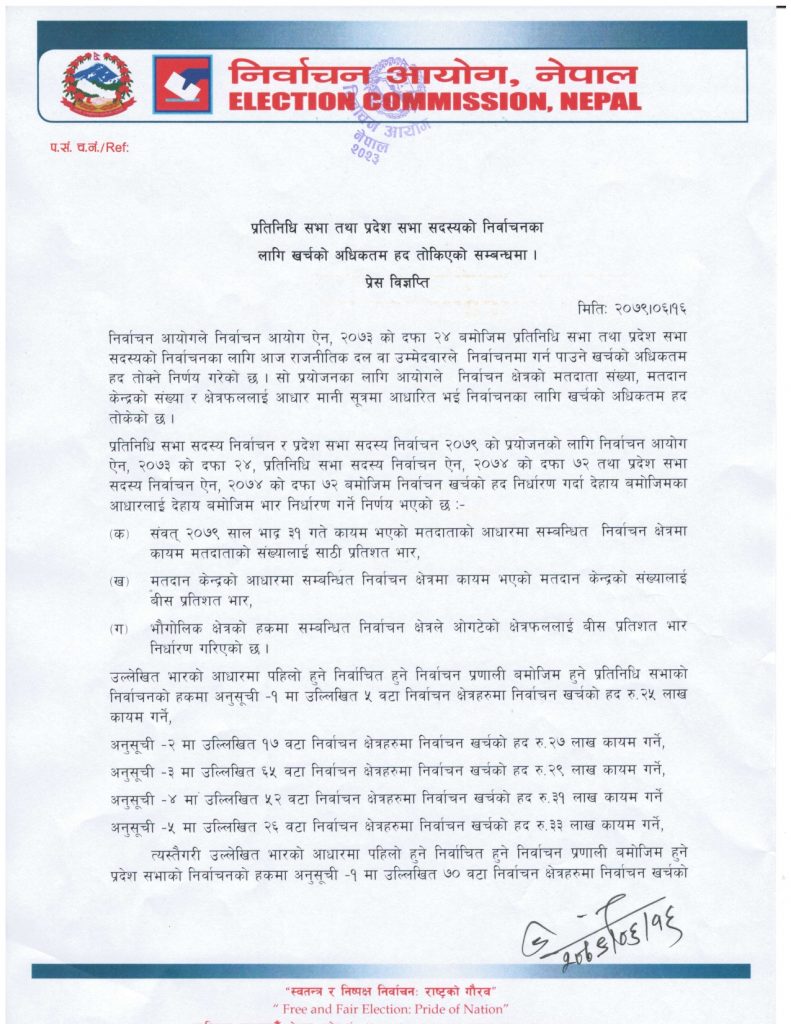
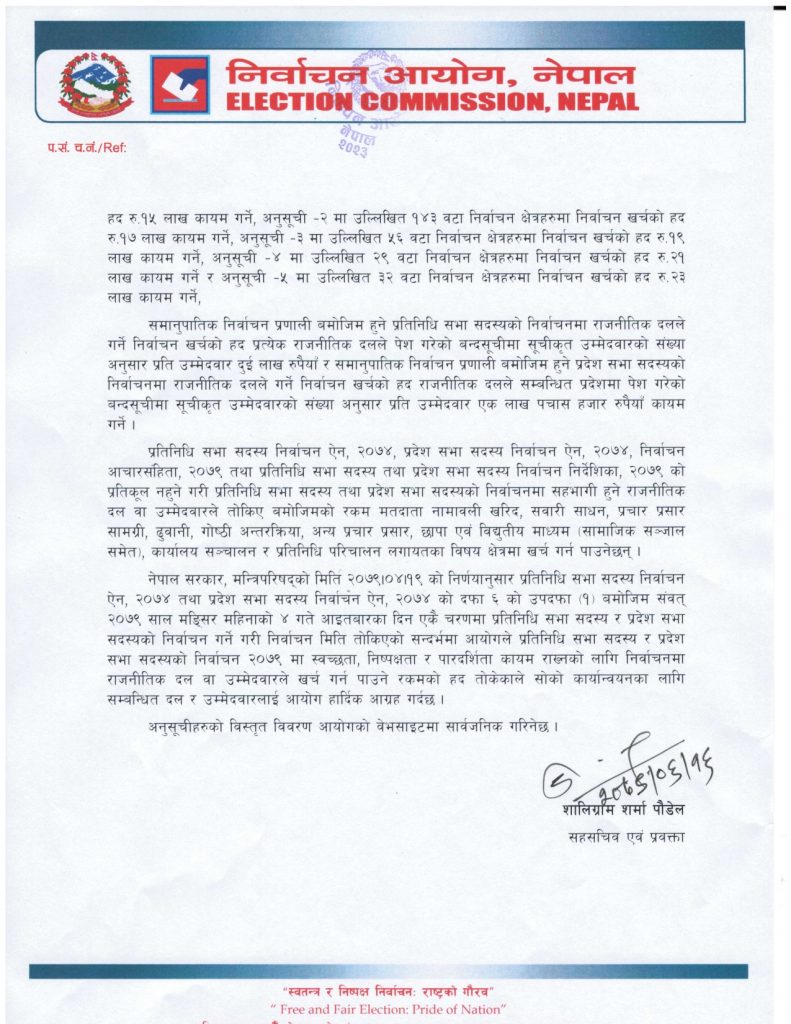
LGBTIQA+ community in Nepal: Upset over electoral underrepresentation
Nepal is gearing up for the general and provincial elections—to elect the 275 members of the federal House of Representatives and 330 members of the seven provincial assemblies—on Nov 20 this year. But the LGBTIQA+ community feels grossly underrepresented and marginalized again, much like in the local elections earlier in May. Despite Article 42 of the 2015 constitution guaranteeing them equal rights in all important state organs, the reality is that lesbians, gays, and transgenders are still easily dismissed. “It’s one thing to make laws about equality and inclusion but quite another to put them into practice,” says Sunita Lama, transgender rights activist. She doesn’t want to vote in the general elections because “it doesn’t matter who is elected”. Unless there are candidates from their community, their issues will again be sidelined. “No one else will work for us,” she says. Lily Thapa of the National Human Rights Commission supports her claims and says there is little participation of the LBGTIQA+ community in politics. “They were sidelined in the local elections too. It’s a human rights violation,” she says. Surya Prasad Aryal, assistant spokesperson, Election Commission of Nepal, says there are only 185 people registered under the ‘others’ category in the voter list. It’s still too early to determine how many candidates from the LGBTIQA+ community are going to contest the elections. He says each party has to meet certain criteria for inclusiveness. But the problem goes beyond what happens at election time. That is just one of the many repercussions of a much larger issue of identity crisis. The fact that the government has tried to force-fit all identities into a single category doesn’t sit well with the LGBTIQA+ community. Transgender males identify themselves as males while transgender females identify themselves as females. ‘Others’ is basically meant for those who don’t identify with either male or female. In the previous elections, there have been issues of gender minorities not being allowed to queue with the gender they identify with. Using an umbrella term for all sexual identities is unfair and undermines their worth, say community members. “It’s humiliating to be a transgender woman and then be called by your dead name [the birth name of a transgender person],” says Lama, adding this makes many people from their community hesitant to participate in the elections. Bhakti Shah, activist, Blue Diamond Society (BDS), says they have been lobbying political parties to include them in the upcoming elections by making the polls safe and inclusive. Shah is hopeful Dilu Buduja (Badri Pun), a transgender man, and Shilpa Chaudhary, a transgender woman, both from the CPN (Unified Socialist) party, chaired by Madhav Kumar Nepal, will get elected. That way, they will at least have someone to voice their concerns in parliament and their issues could then be addressed at policy level. Following Sunil Babu Pant, who became the country’s first gay MP after the 2008 polls, some members of the LGBTIQA+ community had contested the elections in the hopes of repeating the feat. In 2013, Bhumika Shrestha got a seat in Nepali Congress and won the second Constituent Assembly election that year. Her name was then recommended for the federal elections in 2017 but she was later told it had to be pulled back as her citizenship stated her name as ‘Kailash Shrestha’. Laxmi Ghalan, who founded Mitini Nepal, an NGO working for lesbian rights, was another gender minority candidate contesting the 2013 CA election. In 2017, Pinky Gurung, president of BDS, contested the federal parliament elections as a candidate from the Naya Shakti Nepal Party. In the same year, Pun was barred from contesting local level elections in his home district of Myagdi as his citizenship was issued under the ‘third’ category. The district election officer told him he was neither male nor female and was thus disqualified. “The government has included ‘third’ gender in voter rolls, immigration forms, citizenship, and the census. But it’s still largely for show, to appear progressive,” says Pun. Lamenting the fact that people of the LGBTIQA+ community still face many challenges while applying for citizenship, he says this limits their agency and access to important national events like the elections. Elyn Bhandari, activist, BDS, says he isn’t going to vote in the upcoming elections as he isn’t yet on the voter list. The reason is that he would have had to register as a female and he isn’t comfortable with that. “I want to vote in the elections because it’s our right. But I’m not going to unless my citizenship is changed to identify me as male,” he says. Manisha Dhakal, director, BDS, agrees with Bhandari. As a transgender woman, she too feels discriminated when she can’t exercise her right in the way she wants. She says political parties are going against the constitution by not including them in their manifestos and not filing their names as candidates. Representatives from the community are holding discussions and workshops with different political parties on how this can be rectified, in the hope of changing things in future elections, if not the upcoming one. In 2007, Nepal’s Supreme Court ordered the government to end discrimination against the then estimated 350,000 people who made up the LGBTIQA+ community. Homosexuality became legal. This landmark ruling paved the way for equal rights legislation. Since then, it’s been easier for LGBTIQA+ people to come out, without the fear of persecution. But the bias and aversion are still palpable, says Nilam Poudel, transgender activist, model and makeup artist. There have been instances when people have talked about the CPN (Unified Socialist) party as ‘that party which has unnatural people’ in it. Political parties seem to have much to lose by bringing in gays and lesbians. Pun, who belongs to the party, doubts he has gotten the candidacy to represent the LGBTIQA+ community. He says he and his entire family have been involved in politics for far too long not to be picked. Poudel says LGBTIQA+ issues are a political agenda for the parties. There is rarely any commitment to uplift the community. She knows many LGBTIQA+ people won’t vote as they have lost all faith in political parties and the system. “Different political parties have approached me. They have tried to convince me and my friends to vote for them. They say they will guarantee our rights if they win. But I can tell, based on past experiences, that these are empty promises,” she says. Swastika Pariyar, who works at Mitini Nepal, says she too won’t be voting in the general elections. She isn’t interested as the community has never received any political support. But she says there is definitely a need for LGBTIQA+ people to participate in politics. “Madhesis and Dalits, who are marginalized too, have their own candidates in different parties. We need that too,” she says. Pun, on the other hand, thinks there’s a long way to go for that. Political parties aren’t progressive enough. The biases run too deep. Instead, the community could come together and form their own party. But running a political party is an expensive affair. The LGBTIQA+ community is also divided as many people have problems with one another. It needs to give serious thought to how to come together and work for a better future, Pun adds, and not put little rifts over life-altering reforms. Raunaq Singh Adhikari, advocate, says not including LGBTIQA+ people in important state organs is just a bureaucratic hurdle. From a legal standpoint, much is in favor of the community. Despite the constitutional protections, there’s still a certain level of homophobia and transphobia in those in power. “It takes time for the Supreme Court’s directives to be implemented. Those who should be working on it are not doing so,” says Adhikari. For instance, the Supreme Court has repeatedly ruled that people should get citizenship based on the mother’s name but when people go to the ward office, they are denied this right. “We are limited by our mindsets, not by our laws,” he says.

